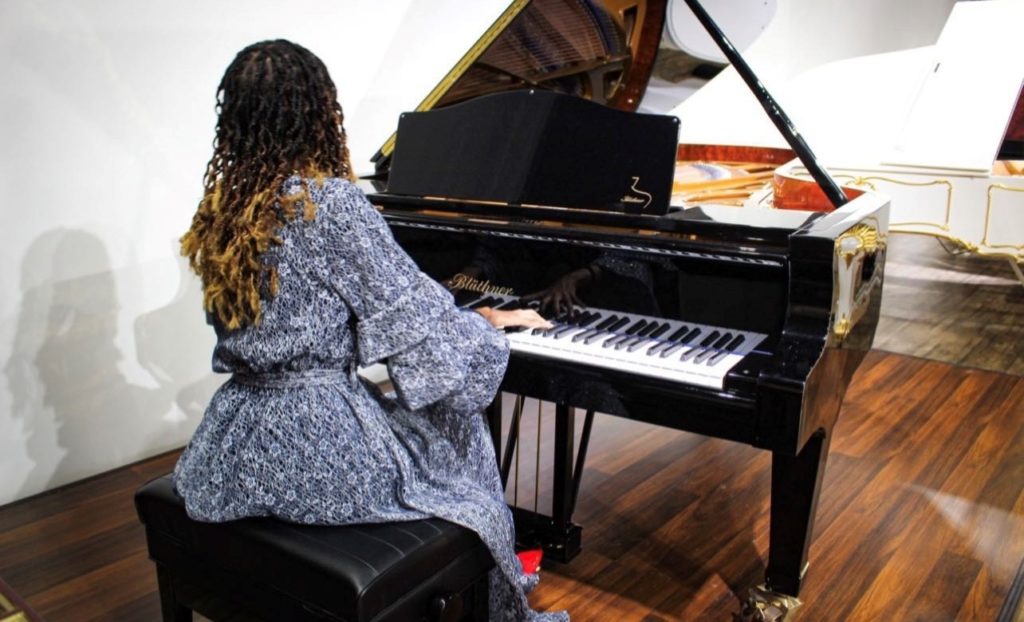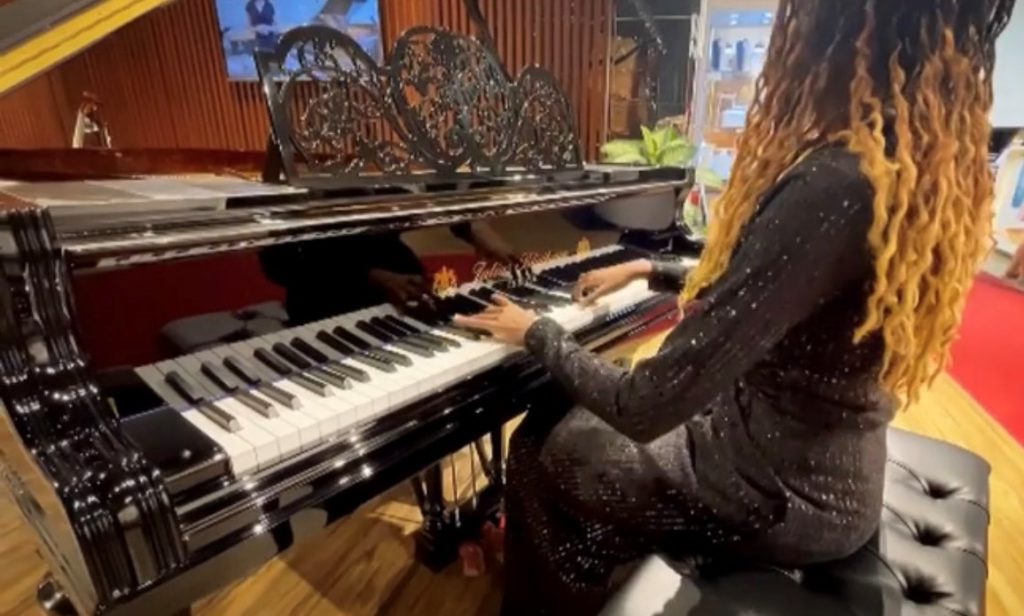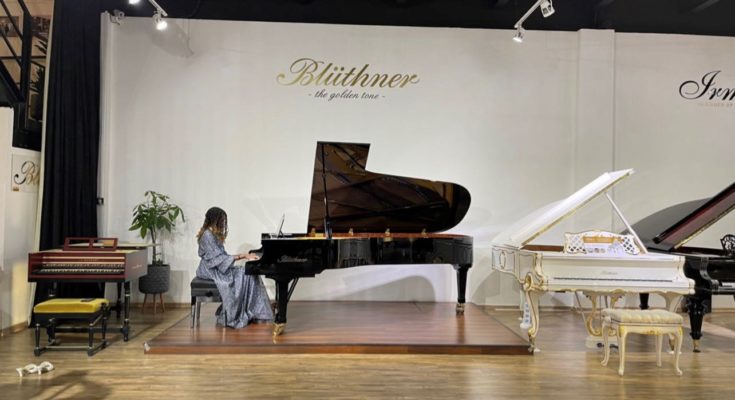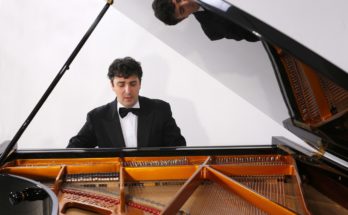PianoMe is used not only by local musicians, but also by international musicians and travelers. One of PianoMe is used not only by locals, but also by international musicians. One of them is Sahar Abdulla. In an interview, Sahar, who is only 20 years old, told us about her current initiatives and why she likes PianoMe so much.
PianoMe (PM): Dear Sahar, thank you very much for your time! It is a great pleasure for us that you are ready for an interview with PianoMe!
Sahar Abdulla (SA): Thank you so much for this opportunity! I’m very pleased to have an interview with you.
PM: That’s great, thank you! First of all, we would like to briefly introduce you to our readers. You are only 20 years old, but you have already performed at the Romania Pavilion at Expo 2020 this year in Dubai. You are a very young and talented musician – what makes you the ideal user and testimonial for PianoMe?
SA: That’s absolutely true, and I’m really very happy that I discovered PianoMe! You do not only support talented musicians, but also provide them an opportunity to be able to rehearse in many cities. Unfortunately, for the time being mainly in Europe, but I hope that you will grow and will also offer your services in Arabian countries soon.
PM: That makes us really happy to hear and we will try to grow as quickly as possible. Would you like to tell us more about yourself and also about Arabian music?
SA: Sure! I’m a 2nd-year international business student at RIT University in Dubai, and for the past few years I’ve been playing piano in several places and events. I also won my first international piano competition in 2018. I started to learn music at an early age and all thanks to prof. Aldo dotto and prof. Victoria who supported and helped me throughout my musical journey. What makes Arabian music different is its unique style: it can be described as modal homophony, florid ornamentation, and modal rhythm.
PM: How would you describe the Arabian music school? Is it more lyrical and expressive?
SA: The Arabian music school, unlike much Western music, includes quarter tones – to the Westerner’s ear this may sound like a single note and it may even seem out of tune. The most popular Arabian music is from Algeria, Bahrain, Egypt, Lebanon, Morocco and Iraq. In addition, Arabic music is characterized by an emphasis on melody and rhythm, so yes, I would say that the majority of Arabian music can be described as lyrical and expressive.

PM: When did the piano first become important to you and who is your favorite composer?
SA: Basically, at the age of 8, I was addicted to classical music. Then I started to play piano and decided to learn musical notes and rhythms. I was intrigued and excited to learn a new musical instrument. After that, I started my musical journey with professional pianists, who started helping me with the basics. When I really started taking my piano lessons seriously, I didn’t just want to make my journey as easy as possible, but rather, learn as much as I could along the way. I began practicing every day, using all the techniques that had been ingrained in me over the years: a tall and relaxed wrist, tonal variation, phrasing and dynamics, interpretation, pedaling and structure, rhythms, and so much more. This helped me read and learn music very quickly. My favorite composer is Ludwig van Beethoven as he was revered for far more than just his music. He was the greatest composer who ever lived and he focused on conveying his inner feelings and mood to the audience through his unique music. In short, you can say that there’s a hidden story behind every note he played.
PM: I see that Beethoven is a composer who remains very close to your heart. What is the attraction of this repertoire, for both player and audiences?
SA: How would you describe the taste of a dinner you enjoy to others who hadn’t tasted it? Likewise, how would one describe Beethoven to those who had never heard his music? For me as a pianist, when I play a piece by Beethoven, his unique style moves me from the real world to the mysterious one. I fall deeply inside his notes. One of the best examples of his classical music is Für Elise, it’s a slightly romantic, pensive little piece. Yes, it’s very short and easy, but it’s still beautiful. When others listen to Beethoven, they may feel that the world is a good place to live in! He allows us to safely investigate feelings of darkness.
PM: By the way, how do you make your repertoire choices?
SA: Finding a new piano piece to play is one of the most exciting parts of being a pianist. One of my best resources is my piano teacher, as she chooses pieces that could challenge me and in my current abilities. Sometimes when I listen to classical music I’m attracted to it start to learn and play it immediately.

PM: How did the move to Dubai affect your playing?
SA: Moving to Dubai has brought me so many opportunities as a pianist. I got the chance to perform in many beautiful venues, as well as in front of big audiences. Although it wasn’t easy, I played in the Expo2020 Dubai, which enhanced my abilities and self-confidence.
PM: What and where was your best performance you have ever given?
SA: My best piano performance was in the Romania Pavilion, in a unique and spectacular avenue, where I played fantasies impromptu by Chopin. I felt that the audience enjoyed my playing, as they were coming from diverse places, and some of them had a classical background as well.
PM: What is your opinion on sharing rehearsal spaces by hosting a rehearsal space on an hourly basis?
SA: It’s a great opportunity! Especially for those who do not have their own instrument at home or are traveling. Such musicians can easily rent practice rooms through PianoMe by the hour. In my opinion, it is also a good way to create community and enable musicians to help each other. And it’s also an opportunity to earn money.
PM: That is exactly our idea actually! Would you recommend PianoMe to a friend?
SA: First of all, it was a pleasure to be interviewed by PianoMe. I appreciate sharing my thoughts with you and I recommend that all my pianists and musical friends share their rehearsing opportunities worldwide.
PM: Finally, what are your aims for the future? Would you like to share any announcement with our readers?
SA: Piano has been more than just an instrument or achievement to me. It has been something that guides my life, morals, and skills, and it has become a significant part of who I am. I’m still working on developing my piano skills, and I aim to have control over my playing to deliver a beautiful and unique message to the audience and build good contact through the music notes. In the future, I hope to incorporate piano in my college years and keep it a steady part of my life. After all, I’m still chasing my dream of owning a baby grand piano! I’m never leaving piano, and piano is never leaving me. I will always have insurmountable love for this instrument.
PM: Dear Sahar, we thank you for the interview and wish you all the best!




